Len Goulden
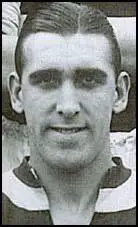
Leonard (Len) Goulden was born in Hackney, London, on 16th July 1912. During the First World War the family moved to Plaistow. A talented footballer Goulden turned out for West Ham Boys. Goulden was selected to play as inside-forward for England Schoolboys against Wales and Scotland in 1926.
Goulden joined West Ham United as an amateur because he was too young too sign as a professional. Charlie Paynter arranged for Goulden to play non-league football with Chelmsford Town.
Goulden was brought back to West Ham and he made his debut against Charlton Athletic on 8th April 1933. Two weeks later he scored his first goal for the club in West Ham's 4-3 victory over Nottingham Forest.
The following season he played in 40 of the 42 league games and developed a great understanding with fellow forwards, Jimmy Ruffell, John Morton and Vic Watson. The team also included Jim Barrett, Alfred Chalkley and Ted Fenton. Despite this group of talented players, West Ham United could only finish in 7th place in Second Division. That year Goulden scored seven goals with Watson ending up as top scorer with 29 in 32 games.
Ernie Gregory, who watched Goulden from the stands of Upton Park before signing for the club in 1936 claimed that: "We've had some great forwards over the years at West Ham but Len was the greatest - the daddy of them all. He was the one I paid my money to see... I can still see Len now - controlling the ball, he killed it instantly... But don't just take my word for it, ask any of the old-timers - they'll tell you the same, Len was the tops."
Over the next few seasons the Goulden inspired West Ham continued to do well without ever being able to clinch promotion finishing 3rd (1934-35), 4th (1935-36) and 6th (1936-37). Despite playing in the Second Division and facing competition from inside-forwards such as Raich Carter, Cliff Bastin, Ray Westwood, Edwin Bowden and Freddie Steele, Goulden was selected to play for England against Norway on 14th May 1937. Goulden celebrated winning his first international cap by scoring in England's 6-0 victory. He retained his place in the side and that year played against Sweden (4-0), Northern Ireland (5-1), Wales (2-1) and Czechoslovakia (5-4).
The England team that year included players such as Stanley Matthews, Albert Geldard, Wilf Copping, Cliff Britton, Stan Cullis, Willie Hall, John Morton, Freddie Steele, George Male, Eddie Hapgood, Cliff Bastin, Alf Young, Bert Sproston, Vic Woodley and Eric Brook.
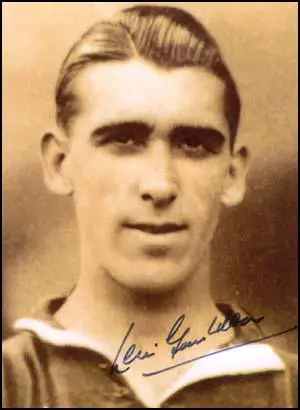
West Ham United could only finish 9th in the 1937-38 season but Goulden retained his place in the England side. In May 1938 England went on a tour of Europe. The first match was against Germany in Berlin. Adolf Hitler wanted to make use of this game as propaganda for his Nazi government. While the England players were getting changed an Football Association official went into their dressing-room and told them that they had to give the raised arm Nazi salute during the playing of the German national anthem. As Stanley Matthews later recalled: "The dressing room erupted. There was bedlam. All the England players were livid and totally opposed to this, myself included. Everyone was shouting at once. Eddie Hapgood, normally a respectful and devoted captain, wagged his finger at the official and told him what he could do with the Nazi salute, which involved putting it where the sun doesn't shine."
The FA official left only to return some minutes later saying he had a direct order from Sir Neville Henderson the British Ambassador in Berlin. The players were told that the political situation between Britain and Germany was now so sensitive that it needed "only a spark to set Europe alight". As a result the England team reluctantly agreed to give the Nazi salute.
The game was watched by 110,000 people as well as senior government figures such as Herman Goering and Joseph Goebbels. England won the game 6-3. This included a goal scored by Len Goulden that Stanley Matthews described as "the greatest goal I ever saw in football". According to Matthews: "Len met the ball on the run; without surrendering any pace, his left leg cocked back like the trigger of a gun, snapped forward and he met the ball full face on the volley. To use modern parlance, his shot was like an Exocet missile. The German goalkeeper may well have seen it coming, but he could do absolutely nothing about it. From 25 yards the ball screamed into the roof of the net with such power that the netting was ripped from two of the pegs by which it was tied to the crossbar."
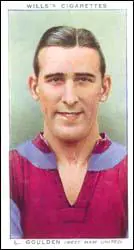
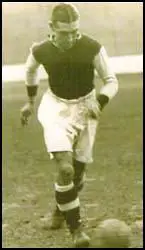
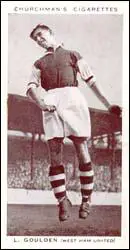
Goulden retained his place in the England side against Switzerland on 21st May 1938. Unfortunately, Eddie Hapgood and Stanley Matthews both suffered serious injuries during the early part of the game and with only nine fit men lost the game 2-1. In the third game of the tour England beat France 4-2.
In the game against Wales the England management selected 19 year-old Tommy Lawton to play alongside Goulden. The two men quickly developed a good partnership and both men scored in the 3-0 victory over FIFA. Later in the season Goulden played in the games against Scotland (2-1), Italy (2-2), Yugoslavia (1-2) and Romania (2-0). Goulden, who was now 27 years old, was in tremendous form. Lawton later argued that Goulden was so good that "he would have played for England in any era."
Goulden played in West Ham's first two matches in the 1939-40 season. However, on Friday, 1st September, 1939, Adolf Hitler ordered the invasion of Poland. On Sunday 3rd September Neville Chamberlain declared war on Germany. The government immediately imposed a ban on the assembly of crowds and as a result the Football League competition was brought to an end.
On 14th September, the government gave permission for football clubs to play friendly matches. In the interests of public safety, the number of spectators allowed to see these games was limited to 8,000. These arrangements were later revised, and clubs were allowed gates of 15,000 from tickets purchased on the day of the game through the turnstiles. The government imposed a fifty mile travelling limit and the Football League divided all the clubs into seven regional areas where games could take place.
After the declaration of war in September 1939, Adolf Hitler did not order the attack of France or Britain as he believed there was still a chance to negotiate an end to the conflict between the countries. This period became known as the Phoney War. As Britain had not experienced any bombing raids, the Football League decided to start a new competition entitled the Football League War Cup.
The entire competition of 137 games including replays was condensed into nine weeks. However, by the time the final took place, the "Phoney War" had come to an end. On 10th May, 1940, Adolf Hitler launched his Western Offensive and invaded France. In the days leading up to the final, the British Expeditionary Force was being evacuated from Dunkirk.
In the final held at Wembley on 8th June, 1940, West Ham United beat Blackburn Rovers 1-0. The government insisted that the kick-off was put back to 6.30 p.m. so that the war effort was not impeded. Despite the fears that London would be bombed by the Luftwaffe, over 42,300 fans decided to take the risk of visiting Wembley. (The Blitz did not begin until 7th September, 1940). Before the game started the band of the Irish Guard played the National Anthem and that of our French allies.
West Ham made a good start to the game and James Barron, the Blackburn goalkeeper, made two great saves from Stan Foxall. In the 34th minute Foxall went past several Blackburn players on the left-wing before giving it to Len Goulden who passed it onto George Foreman who fired in a fierce shot that Barron who could only push the ball out to a waiting Sam Small who scored easily from close-range.
The midfield of Len Goulden, Archibald Macaulay, Ted Fenton and Joe Cockroft were on top form and this enabled West Ham to take control of the game. However, injuries to full-back and captain Charlie Bicknell and Goulden made the last 20 minutes a struggle. Centre-half Dick Walker, admitted that the team "struggled a bit" but they were able to hang onto a 1-0 victory.
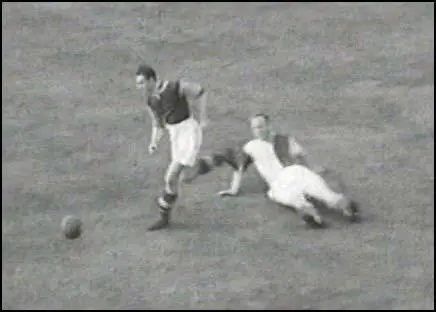
Goulden joined the police force soon after the outbreak of the Second World War and was able to continue to play 152 friendly games (52 goals) for West Ham United and six unofficial international games for England during the conflict.
Goulden was 34 years old by the time the Football League began in the 1946-47 season. He was considered too old to play for England but Chelsea was willing to pay £5,000 for his services. During his time at West Ham United Goulden scored 54 league goals in 239 appearances.
Goulden now had the opportunity to play First Division football for the first-time. Tony Matthews, the author of Who's Who of Chelsea, described Goulden as "a brainy footballer, he could change the point of attack with one flash of brilliance, sweeping out a pass fully 40 yards".
Goulden now joined up with Tommy Lawton who had also been signed by Chelsea. Lawton later claimed that Goulden's passes were "just the sort that centre-forwards pray for." Despite Goulden's good form, Chelsea struggled in the league and over the next four seasons finished 15th (1946-47), 18th (1947-48), 13th (1948-49) and 13th (1949-50).
Goulden retired in May 1950. During his time at Chelsea he had scored 19 goals in 111 appearances. He remained at the club as a coach. In November 1952 he was appointed as manager of Watford. He also coached in Libya.
In 1956 Goulden began work as a sub-postmaster. Later he was employed at a United States Air Force base in Northamptonshire before working as a coach at Oxford United (January 1969 - February 1970).
Len Goulden died in Cornwall on 14th February 1995.
Primary Sources
(1) Ernie Gregory, quoted in The Essential History of West Ham United (2000)
We've had some great forwards over the years at West Ham but Len was the greatest - the daddy of them all. He was the one I paid my money to see... I can still see Len now - controlling the ball, he killed it instantly... But don't just take my word for it, ask any of the old-timers - they'll tell you the same, Len was the tops.
(2) Stanley Matthews, The Way It Was (2000)
The England changing room was situated right at the very top of the main stand which meant, after a walk down a tunnel that made Wembley's seem like the lobby of a terraced house, we had to climb about 90 concrete steps before reaching it. We took to that walk as if we were a group of high-spirited lads making our way to the local pub for a night out. We were all in a buoyant and excited mood, but the best was yet to come in the form of what was probably the greatest goal I ever saw in football, courtesy of Len Goulden.
In the second half, Alf Young broke down a German attack and played the ball to Charlton's Don Welsh who was making his England debut. We came out of defence with a series of one-touch passes that left the Germans chasing shadows before the ball was finally played out to me on the right. I took off towards Munzenberg, by now run ragged. Such was my confidence that as I ran towards him, I criss-crossed my legs over the ball as I ran and, on reaching him, swept the ball past him with the outside of my right boot and followed it. I could hear Munzenberg and the German left-half panting behind me. I glanced across and saw Len Goulden steaming in just left of the centre of midfield, some 35 yards from goal. I arced around the ball in order to get some power behind the cross and picked my spot just ahead of Len. He met the ball at around knee height. My initial thought was that he'd control it and take it on to get nearer the German goal, but he didn't. Len met the ball on the run; without surrendering any pace, his left leg cocked back like the trigger of a gun, snapped forward and he met the ball full face on the volley. To use modern parlance, his shot was like an Exocet missile. The German goalkeeper may well have seen it coming, but he could do absolutely nothing about it. From 25 yards the ball screamed into the roof of the net with such power that the netting was ripped from two of the pegs by which it was tied to the crossbar. The terraces of the packed Olympic Stadium were as lifeless as a string of dead fish.
"Let them salute that one," Len yelled as he carried on running, arms aloft.
We'd been given little chance, but when the final whistle sounded, the scoreline of Germany 3 England 6 told its own story. As well as myself, the England goals that day came from Robinson (2), Bastin, Broome and Len Goulden's Exocet. It was perhaps the finest England performance I was ever involved in. Every player was at the top of his game, to a man we played out of our skins and Len Goulden's goal will live forever in the memory. If there had been televised football in those days, Len's goal would never have been off the screens. It was truly marvellous.
(3) David McVay & Andy Smith, The Complete Centre-Forward (2000)
Lawton reported, as instructed, to the Adelphi Hotel in Liverpool the following Tuesday to link up with the rest of the Football League team prior to catching the ferry across to Belfast. The rest of his teammates were familiar names to him but he did not know any of them well. Eddie Hapgood, the captain, and Stanley Matthews both made the teenager welcome, but could do little about his nerves, not so much about the game, more because of the impending sea crossing. Tommy was relieved when the ferry reached Belfast without incident, but only just in time. En route to Windsor Park, heavy rain was whipped up by a gale into a massive downpour. Hardly the best of days for football. Ten minutes into the second half, with the score level at 2-2, the rain became torrential. "I suppose there were about 2,000 spectators on the uncovered terrace on one side of the ground and they'd obviously decided they'd had enough of getting soaked through, so they just swarmed across the pitch and dashed for the cover of the stand on the other side." The game was held up for several minutes as this invasion took place, the players, engulfed by the crowd, could not believe what was happening. In the middle of the confusion, all Lawton could hear was referee Peter Craigmyle repeatedly blowing his whistle as he tried to restore order. Eventually the game resumed and the Football League swept to an 8-2 victory. Lawton scored four.
"The hold-up affected the Irish more than us, I think. After that, Stan and Len Goulden just hit top form. Stan was just dazzling down the right. Len made my third with a pass that just split the defence, all I had to do was run onto it and hit it." The headlines on the back pages the following day hailed Lawton's goalscoring brilliance and called for his inclusion in the full England team. Lawton, however, always insisted that no-one should "run away with the idea that I was the star of that game. Stan Matthews and Len Goulden were at their best that day and nobody could outshine them. Len's pass for that third goal of mine was just the sort that centre-forwards pray for."
(4) England Football Online (21st July 2002)
Early in the second half, Robinson restored England's three-goal lead with a low drive that veteran German goalkeeper Hans Jakob did not expect. Broome missed a great chance for his second goal when he got by left back Reinhold Münzenberg, but sent his shot straight at Jakob. With less than 15 minutes left, Pesser reduced the gap once again when he seized on confusion between Woodley and right back Bert Sproston to score Germany's third. But England were not to be denied their three-goal victory margin. With 10 minutes left, the little inside left Len Goulden struck a tremendous shot from 30 yards that went in just under the crossbar and tore the netting away from it.
The result surely demoralized the German team. The next month in Paris, they managed only an opening round 1-1 extra-time draw against Switzerland and went out to the Swiss in the replay, 4-2. A little more than a year later England and Germany were at war.
The career statistics of the players who took the pitch that day demonstrate the toll World War II took on their playing careers. England played no official internationals in the seven years between May 24, 1939 and September 28, 1946. Of this England team, only Stanley Matthews wore the England colours following the war, and he was never again the international goalscorer he had been before the war. The Germans continued playing internationals through 1942, but, expelled from FIFA immediately after the war in 1946, did not resume international play until late1950. Of this German team, only Andeas Kupfer played internationally after the war, and then only once, in West Germany's single 1950 match.

